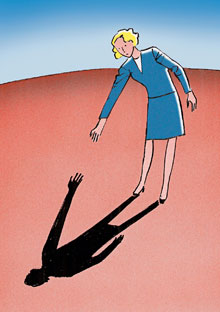Flaws 'R' Us

Illustration: Guy Billout
Since the 1960s, cognitive behavioral therapy (CBT)—the quick-hitting, practical approach to psychological problems—has slowly eclipsed the appeal of spending decades on an analyst's couch rehashing your childhood. The theory behind CBT is that by modifying or replacing destructive thoughts with helpful ones, people can learn to deal with everything from depression to panic disorders to overeating. And there is a lot of good evidence that it works.
Now, however, an offshoot known as acceptance and commitment therapy (ACT) is stirring up the therapeutic waters. It challenges the idea that overruling negativity is the surest route to mental health. "When we try to push away difficult thoughts and feelings, they tend to become more central," says Steven Hayes, PhD, one of the psychologists who developed ACT and a professor of clinical psychology at the University of Nevada, Reno. "You need to address negative thoughts, not just make them 'go away.'" More helpful, he and others suggest, is to try to accept the thoughts with some compassion, which reduces their impact; then get on with what you want to do in life.
Hayes offers an example of a panicked public speaker who tries to tough it out, telling herself: "There's nothing to be afraid of. Just do it!" Trying to ignore your dread often backfires and makes it more dominant. Instead, Hayes suggests, simply notice the fears: "They are like a beacon pointing at what you most deeply want." Are you afraid of making a fool of yourself or boring people to death? Rather than dwell on those fears as the enemy, let them remind you how much you care about being respected or loved or making a difference in others' lives. Then you're freer to focus on how to achieve these desires. "Prepare thoroughly for the talk, explore your creative ideas, work on letting yourself be seen," says Hayes, "and stop wasting energy on getting the fear to go away."
Early research on ACT has shown it to be effective in alleviating problems like depression, anxiety, chronic pain, and psychosis. New findings also suggest it's helpful with weight loss, in part because patients learn to stop buying into their critical self-talk and to tolerate discomfort, which is key to sticking to a program of diet and exercise.
To get more of a feel for ACT, check out Hayes's workbook, Get Out of Your Mind & Into Your Life. Or find an ACT therapist at ContextualPsychology.org.
Now, however, an offshoot known as acceptance and commitment therapy (ACT) is stirring up the therapeutic waters. It challenges the idea that overruling negativity is the surest route to mental health. "When we try to push away difficult thoughts and feelings, they tend to become more central," says Steven Hayes, PhD, one of the psychologists who developed ACT and a professor of clinical psychology at the University of Nevada, Reno. "You need to address negative thoughts, not just make them 'go away.'" More helpful, he and others suggest, is to try to accept the thoughts with some compassion, which reduces their impact; then get on with what you want to do in life.
Hayes offers an example of a panicked public speaker who tries to tough it out, telling herself: "There's nothing to be afraid of. Just do it!" Trying to ignore your dread often backfires and makes it more dominant. Instead, Hayes suggests, simply notice the fears: "They are like a beacon pointing at what you most deeply want." Are you afraid of making a fool of yourself or boring people to death? Rather than dwell on those fears as the enemy, let them remind you how much you care about being respected or loved or making a difference in others' lives. Then you're freer to focus on how to achieve these desires. "Prepare thoroughly for the talk, explore your creative ideas, work on letting yourself be seen," says Hayes, "and stop wasting energy on getting the fear to go away."
Early research on ACT has shown it to be effective in alleviating problems like depression, anxiety, chronic pain, and psychosis. New findings also suggest it's helpful with weight loss, in part because patients learn to stop buying into their critical self-talk and to tolerate discomfort, which is key to sticking to a program of diet and exercise.
To get more of a feel for ACT, check out Hayes's workbook, Get Out of Your Mind & Into Your Life. Or find an ACT therapist at ContextualPsychology.org.
As a reminder, always consult your doctor for medical advice and treatment before starting any program.



